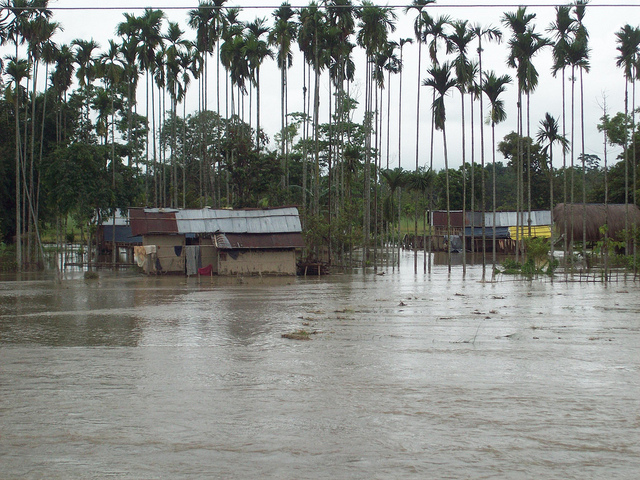The essence of a river is its ebb and flow but won't taming of the fresh free-flowing rivers by building massive dams pose a threat to our rivers and the communities that live by them?
Participants from different parts of the country who congregated at the first ever India Rivers Week held at Delhi, discussed the issue in the wake of the present government’s move to ‘fast-track’ the interlinking of rivers. The group was apprehensive that the project would amount to committing a deliberate hydrocide. The sense of the house was that the government should not go ahead with the interlinking of rivers until basin-wide options assessment was done in consultation with, and with the consent of the gram sabhas and communities.
Ramaswamy Iyer, former Secretary to the Government of India, who moderated the open debate on “interlinking of rivers” at the first ever India Rivers Week said, “interlinking of rivers has nothing to give to drylands of India”. Iyer expressed his distress at the move to expedite the project and stressed that the project was fundamentally flawed and potentially disastrous. "The deeply disquieting judgment by the Supreme Court in 2002 was a case of judicial overreach", he said.
Iyer noted that the National Commission on Integrated Water Resource Development Report had, in 1999, observed that optimal utilization of land and water should be aimed at fully exploiting intra-basin surpluses before considering inter-basin transfers. “The Commission had, after a careful examination of the water balances in the various basins, noted that there was no imperative need for massive water transfers. The assessed needs could be met with more efficient utilization of intra-basin resources, except in the case of the Cauvery and Vaigai basins where limited water transfers could take place by transferring water from Godavari River".
Lack of scientific basis of the project
Himanshu Thakkar, SANDRP, New Delhi, a panelist at the session deplored the lack of scientific basis of the project and said that “There is a need to do a proper basin and sub-basin wide options assessment for water resources management and development. Such options assessment would include local rainwater harvesting, watershed development, groundwater recharge, local water systems, optimum use of existing water resources, proper cropping pattern, System of Rice Intensification, treatment and recycling of effluents and demand side measures”. No such assessment has been undertaken in any river basin or sub-basin in India.

Thakkar questioned the soundness of the project in terms of the various benefits that are claimed on its behalf. “Groundwater constitutes the bulk of the water that is used in agriculture, drinking and in industrial sectors. The government needs to wake up to this reality. It should focus on increasing groundwater recharge and at the same time taking up community-led regulation and demand measures to reduce groundwater exploitation”, he said.
Dubious assessment of basin water availability
Brij Gopal, an eminent ecological scientist who had worked extensively on the Ken-Betwa river ecosystem, questioned the hydrologic viability of the gargantuan scheme. He challenged the very concept of surplus and deficit rivers. "Does the Ken river have surplus water to transfer to the Betwa"? He also wondered how the detailed project report has put forth different per capita basin water requirements for the two basins with similar characteristics. "Why have the people of the tribal dominated area where the proposed Doudhan dam is being constructed been not consulted? The loss to Panna Tiger Reserve and the Ghariyal sanctuary in the downstream of Gangau dam will be immense owing to submergence", he said. He highlighted the reduction in downstream flows and the permanent damage caused to the fisheries, wildlife and biodiversity.
Manoj Misra, PEACE Institute, New Delhi said that “There is a need for urgent reconsideration of the decision”. He urged that the union government supplement its talks with various state governments with civil society moves to bring the peoples' voice to the forefront.
Interlinking highly cost ineffective
Suresh Babu, WWF, India raised the issue of economic feasibility of the interlinking project, which is slated to cost a whopping Rs. 11.2 lakh crore. "This surely cannot be met from the government’s planned expenditure". The claims of the National Council of Applied Economic Research (NCAER) report regarding the several benefits of the programme by way of irrigation & power, improvement in growth rate of agriculture etc., were dubious. “Even if the government raises the capital through loans, taxes and global financing, from where will it improve the cost recovery when irrigation will be unable to marginally recover even the running cost, let alone the project establishment cost. Where is the capital of this magnitude going to come from?", he questioned.
No interlinking if it causes damage to environment
“Government will not proceed with interlinking of rivers if environmental consequences are adverse”, said Uma Bharti, Union Minister of Water Resources, River Development and Ganga Rejuvenation in her valedictory address at the India Rivers Week. She emphasized, “If we want to save our rivers, the first step is to ensure that no untreated effluent or sewage is mixed with treated water and flows into our rivers". She clarified that strict environmental regulations will be enforced while taking up the project.
“River- based projects may be a painful choice, but we cannot close our doors to it as it yields ‘rich dividends’ for the people”, she said. She assured that minimum environmental flows will be maintained in the river itself and that a taskforce has been set up to “understand the ecological and environmental consequences of interlinking of projects”.
Manoj Misra, member of the organizing committee of India Rivers Week cautioned her not to proceed hurriedly on the project given its adverse social and ecological consequences.
This post presents an open debate on interlinking of rivers moderated by Ramaswamy Iyer with Himanshu Thakkar and Brij Gopal as panelists. The debate was held as a part of the India Rivers Week organized at New Delhi during 24-27th November, 2014.













